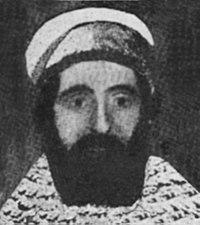| Revision as of 10:21, 5 April 2024 editCommontater (talk | contribs)Extended confirmed users842 edits fixed typo← Previous edit | Revision as of 14:07, 13 May 2024 edit undoPeleYoetz (talk | contribs)Extended confirmed users1,225 edits I entered more info about himTag: Visual editNext edit → | ||
| Line 48: | Line 48: | ||
| '''Chaim Abraham Gagin''' (1787–1848) was ] from 1842 to 1848. | '''Chaim Abraham Gagin''' (1787–1848) was ] from 1842 to 1848. | ||
| Born in ],<ref name=":0">{{Cite book |last=ברטל |first=ישראל |title=הישוב הישן הספרדי בארץ ישראל |publisher=מכון בן-צבי לחקר קהילות ישראל במזרח של יד בן-צבי והאוניברסיטה העברית |editor-last=בן-נאה |editor-first=ירון |pages=15 |language=he |chapter=הארץ ויהודיה |issn=1565-0774 |editor-last2=הלד דילהרוזה |editor-first2=מיכל}}</ref> he was the grandson of the Jerusalem Kabbalist ].<ref name="Chaim Abraham Gagin. SepherHatakanothVehaskamoth">{{cite web |title=Chaim Abraham Gagin. Sepher Hatakanoth Vehaskamoth |url=https://www.kestenbaum.net/content.php?item=3208 |url-status=dead |archive-url=https://web.archive.org/web/20160304101544/https://www.kestenbaum.net/content.php?item=3208 |archive-date=4 March 2016 |access-date=9 August 2015 |publisher=Kestenbaum & Co.}}</ref> Gagin was the first individual to hold both the positions of Hakham Bashi and ] simultaneously following their merger.<ref name="Chaim Abraham Gagin. SepherHatakanothVehaskamoth" /> | |||
| Regarded as one of the foremost poskim (Jewish legal decisors) of his era, Gagin also oversaw the Tiferet Yerushalaim Yeshiva.<ref name=":0" /> Among his notable works is ''Sepher Hatakanoth Vehaskamoth,'' a compendium of Jewish religious rites and customs as practiced in the City of Jerusalem.<ref name="Chaim Abraham Gagin. SepherHatakanothVehaskamoth" /><ref name="Westreich">{{cite journal |last1=Westreich |first1=Elimelech |date=2012 |title=Jewish Judicial Autonomy in Nineteenth Century Jerusalem: Background, Jurisdiction, Structure |journal=Jewish Law Association Studies |volume=22 |page=303 |issn=0890-7552}}</ref> | |||
| In the years 1831-1840, the muslims in the Land of Israel were persecuting the Samaritans to either convert to islam or die, claiming that the Samaritans due to not being either Jewish or Christians were "idol worshippers" and therefore must be killed. The Samaritans asked Gagin to help them, and he wrote a document that the Samaritans are a "Jewish sect" to save them from extermination after many of them were forced to convert to islam.<ref>], "The Book of the Samaritans", 19353 Pp.36.</ref> | In the years 1831-1840, the muslims in the Land of Israel were persecuting the Samaritans to either convert to islam or die, claiming that the Samaritans due to not being either Jewish or Christians were "idol worshippers" and therefore must be killed. The Samaritans asked Gagin to help them, and he wrote a document that the Samaritans are a "Jewish sect" to save them from extermination after many of them were forced to convert to islam.<ref>], "The Book of the Samaritans", 19353 Pp.36.</ref> | ||
Revision as of 14:07, 13 May 2024
| Chaim Abraham Gagin | |
|---|---|
 image attributed to Chaim Abraham Gaguine image attributed to Chaim Abraham Gaguine | |
| Personal life | |
| Born | 1787 Constantinople, Ottoman Empire |
| Died | 23 May 1848(1848-05-23) (aged 60–61) Jerusalem, Ottoman Empire |
| Religious life | |
| Religion | Judaism |
| Jewish leader | |
| Predecessor | Yehuda Navon |
| Successor | Yitzhak Kovo |
Chaim Abraham Gagin (1787–1848) was Chief Rabbi of Ottoman Palestine from 1842 to 1848.
Born in Constantinople, he was the grandson of the Jerusalem Kabbalist Shalom Sharabi. Gagin was the first individual to hold both the positions of Hakham Bashi and Rishon Lezion simultaneously following their merger.
Regarded as one of the foremost poskim (Jewish legal decisors) of his era, Gagin also oversaw the Tiferet Yerushalaim Yeshiva. Among his notable works is Sepher Hatakanoth Vehaskamoth, a compendium of Jewish religious rites and customs as practiced in the City of Jerusalem.
In the years 1831-1840, the muslims in the Land of Israel were persecuting the Samaritans to either convert to islam or die, claiming that the Samaritans due to not being either Jewish or Christians were "idol worshippers" and therefore must be killed. The Samaritans asked Gagin to help them, and he wrote a document that the Samaritans are a "Jewish sect" to save them from extermination after many of them were forced to convert to islam.
References
- ^ ברטל, ישראל. "הארץ ויהודיה". In בן-נאה, ירון; הלד דילהרוזה, מיכל (eds.). הישוב הישן הספרדי בארץ ישראל (in Hebrew). מכון בן-צבי לחקר קהילות ישראל במזרח של יד בן-צבי והאוניברסיטה העברית. p. 15. ISSN 1565-0774.
- ^ "Chaim Abraham Gagin. Sepher Hatakanoth Vehaskamoth". Kestenbaum & Co. Archived from the original on 4 March 2016. Retrieved 9 August 2015.
- Westreich, Elimelech (2012). "Jewish Judicial Autonomy in Nineteenth Century Jerusalem: Background, Jurisdiction, Structure". Jewish Law Association Studies. 22: 303. ISSN 0890-7552.
- Isaac Ben-Zvi, "The Book of the Samaritans", 19353 Pp.36.
| Heads of Beit El Kabbalist yeshiva | |
|---|---|
|